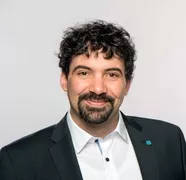Prof. Dr. Stephan Jonas has been a tenured track professor for digital health at the Department of Informatics of the Technical University of Munich. On Tuesday evening the Department Council of the Department of Sport and Health Sciences confirmed the 35-year-old to be a secondary member of the department.
In 2009 at the RWTH Aachen, Prof. Jonas completed his diploma in the field of computer sciences. This was followed by a three-year research visit at Yale University in automated image processing, interrupted for one semester at the Reykjavik University in Iceland. In 2012, Jonas concluded his doctorate in image processing at the Universities of Yale and the RWTH Aachen. Starting from 2014 he led a working group on "mobile Health (mHealth)" at the Department of Medical Informatics at the RWTH Aachen. He has performed research, among other things, on the E-learning of manual abilities through the recognition of muscle activity.
Prof. Jonas, you are a professor for digital health. What does that mean precisely?
"The basic idea of the professorship is to form a bridge between computer science, and the sports and health sciences. At the TUM I would also like to act as a mediator between the two departments.
Digital health is involved with technologies for the collection of health data - from wearables, smartphones, smartwatches even up to armbands. How can devices be validated? How are they best to use? A goal is that these technologies are meaningfully applicable, for example also to be used in clinical studies.
Thus, my work is also meant as a service. I would like to thereby support others, to become even more efficient using digital technologies in research."
The market for digital health devices is booming.
"Absolutely, Amazon has more than 10,000 different devices in their subshop for wearables. The spectrum extends from classical heart frequency bracelets to more extravagant bracelets which can actually also measure the muscle activity, for example, and even as far as to mobile brain/computer interfaces, or actually EEGs. There is in principle something for everyone. The question is only if the devices are suitable to solve scientific questions. And this is where we come into play."
Where does your expertise actually lie?
"We have, for instance, already accomplished validating studies with different devices. The quality is very different. There are outstanding devices; for example a bracelet, which has eight surface EMGs and is quasi on a clinical standard of a brain/computer interface.
Naturally, one cannot expect to get the same for €900 as for €10,000. However, of course, also negative examples exist. Devices, with which one does not know at all what data one is receiving."
What will your principal fields of activity be?
"I look forward to work in the fields of sport and health, because I think these are very dynamic fields and that a great deal can be achieved for health. The use of technology is additionally somewhat more simple in the field of fitness than in a medical setting, which is very regimented."
The second main line of focus lies in the development and use of solutions from the field of the computer sciences?
"Correct. I believe that the quantity of data will continue to increase further and more drastically in the future. We are in the middle of the second large digitalization wave. So far, data has primarily been collected by experts and scientists. This is presently changing. With technical devices even laymen are able to collect their own data.
As a result, much more data is available which must additionally be taken into consideration. We must create this data so abstractedly that it is nearly understandable. That is a great challenge with which I would also like to help. After all, apart from the field of sensor technology I have already gained a great deal of experience as to how one deals with data. The software, for instance, could automatically program an app for data acquisition or to support us in the interpretation of measured values."
How would that look concretely?
"Think about a field study: Here, the question arises as to whether or not the data can be re-recorded without the participants being aware of this. That has not become any easier through the demands of the basic data security regulations (DSGVO). My goal is to simplify this entire process, if possible, for those who perform such studies.
Conceivable, for example, would be a software in which one can design a study using sensors through different clicks. The software would then automatically provide an app, which recognizes the sensors used and re-records the data, stores this in conformance with data security and provides a report for those dealing with data security. It is one of my goals to help support this process, to slim this entire process somewhat."
A final question: Do you actually participate in sports?
"I enjoy riding my bicycle. That can be done on the way to and from work. In former times, I played badminton and participated in rowing. Currently, however, my two small children do more to keep me moving [laughs]."
CONTACT:
Prof. Dr. Stephan Jonas
Department of Computer Science & Department of Sport and Health Sciences
Georg-Brauchle-Ring 60/62
80992 Munich
E-Mail: Stephan.Jonas(at)tum.de
Interview: Dr. Fabian Kautz
Photo: TUM/Astrid Eckert
